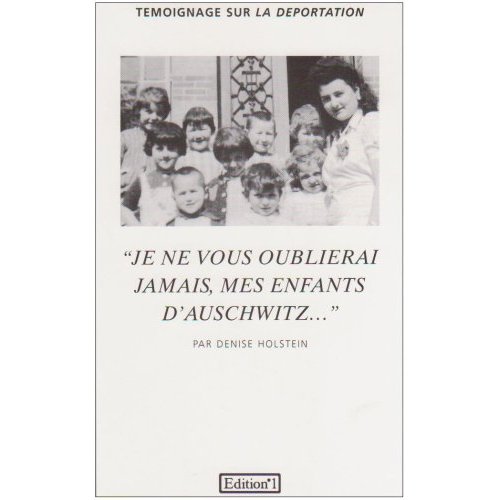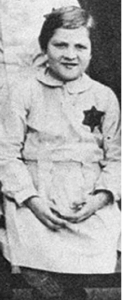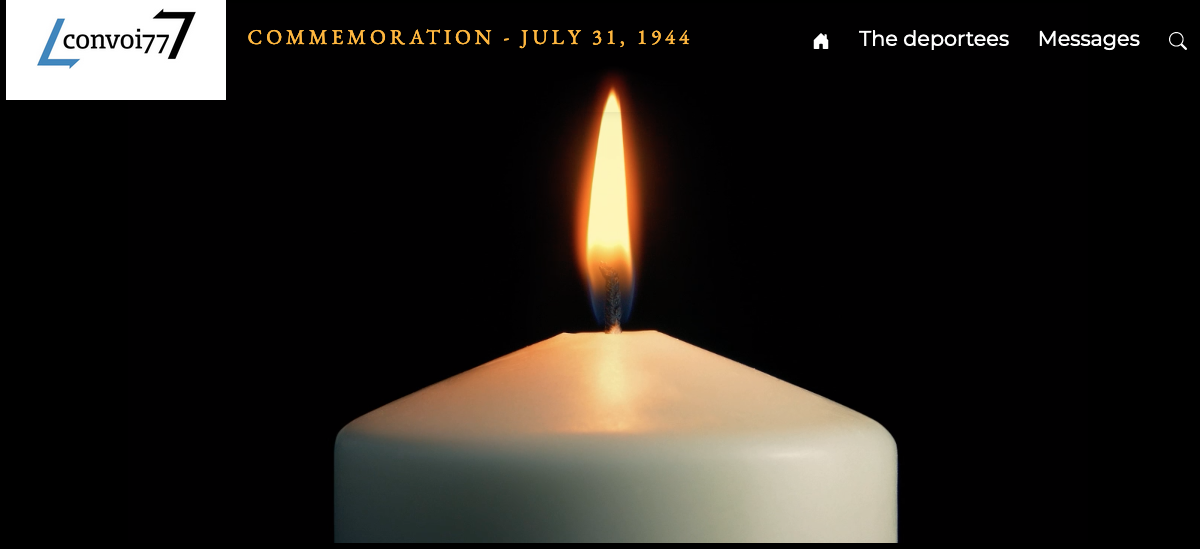Denise HOLSTEIN
Denise HOLSTEIN was born on February 6, 1927. Her family included her father, Bernard HOLSTEIN, a dentist, born in Kovno (Kaunas), Lithuania, her mother Juliette née Cohen, born in Paris and her brother Jean, born on July 26, 1924.
Denise attended school at the Lycée Corneille and then at the Lycée Jeanne d’Arc.
1938: The family acquired the building at n°79 rue Jeanne-d’Arc in Rouen and moved in there. The father moved his practice to that address.
1939: Bernard HOLSTEIN was mobilized in September as a lieutenant and assigned to the hospital in Rouen.
1940: After the rout of the French army came flight to the south. Juliette, Denise’s mother, signed up as an ambulance driver and followed her husband to war. They were victims of a bombing that marked them for life.
Denise and her brother Jean fled with their maternal grandmother and great-grandmother by way of Vierzon. The family regrouped in Avignon, where Bernard declined an offer to take over his recently deceased brother’s dental practice.
The following testimony from Denise HOLSTEIN is in French.In October the family returned to Rouen in the Occupied Zone, and Denise entered the Lycée Corneille.
Bernard HOLSTEIN, under the race laws promulgated by the Vichy regime, was the only Jew authorized to practice dentistry on the right bank of the Seine in Rouen.
1942: On May 6th Bernard HOLSTEIN was rounded up with 76 other men recognized as Jews and interned in the holding camp at Drancy (today in the Seine-St-Denis department).
In June Jean, not yet 18 years old, sought safety with his family in Avignon. Ill, he was sent to Villard-de-Lans (Isère department) in the mountains.
On August 8th Bernard HOLSTEIN and one other victim of the roundup were the only two who came home.
1943: At 9:00 in the evening on January 15th Denise and her parents were arrested at their home in the roundup of all the Jews in Rouen and the department of the Seine-Inférieure (today the Seine-Maritime). They were taken to the Drancy camp the next morning.
On March 5th Denise was sent from Drancy to the Claude Bernard Hospital to be treated for diphtheria and mumps. She received news of her parents through her maternal grandmother, but never saw them again.
March 31st: Denise HOLSTEIN was released from the hospital and placed in Paris centers for Jewish orphans of deported parents (run by the General Union of the Israelites of France (UGIF). She continued school at the Lycée Lamartine in the 9th district.
At the beginning of the summer of 1943 Denise was taken to the UGIF center in Louveciennes (today in the Yvelines department near Versailles); there she pursued her studies and was chosen to monitor a group of children.
April: Denise received a clandestine visit from her maternal grandmother and her friend, Christiane Le Rouxel, who took some photos.
November 1st: Denise returned to Louveciennes after an operation to remove her appendix.
November 29th: Denise’s parents were deported to Auschwitz II-Birkenau, where they were immediately murdered.
1944: On July 22 the children and their monitors at the Louveciennes center were picked up as part of a larger roundup.
On July 31 they were deported in convoy n°77. Only two of her former dorm mates survived — Samuel Przemisliawski, deported to Bergen-Belsen as the son of a war prisoner, and Paulette Sklarz, who was in the St-Germain hospital at the moment of the roundup. Among other survivors of the UGIF Louveciennes Center were Pierre, Josette, and François Nelson, and two other Przemisliawski children, Régine and Maurice, also deported to Bergen-Belsen thanks to their fathers’ status as a war prisoner.
On the night of August 2nd to August 3rd she arrived at Birkenau, where, thanks to the advice of a French member of the Canada kommando (crew of deportees who “assisted” in unloading the new deportees from the freight cars), Denise let go of the children’s hands and was selected for labor. She survived in different work kommandos (units) and was twice in the Revier infirmary.
December 31st: Denise was evacuated by train to the Bergen-Belsen camp (now in the German state of Lower Saxony).
1945: On April 15th she was liberated by British soldiers. Ill with typhus, she was placed in quarantine.
On the 8th of May the war ended in Europe.
At the end of May Denise returned to Paris. There she was reunited at n°53 rue de Châteaudun (9th district) with her maternal grandmother and great-grandmother, her brother Jean, and her cousins.
June: trip to Rouen.
July and August: a stay in Brighton, a hamlet of Cayeux-sur-Mer (Somme department), with the Sanson family, close friends of her parents. She there saw her friend Isabelle again. She wrote the manuscript put out by the publishing house “Le Manuscrit” under the title ” Le Manuscrit de Cayeux”. The manuscript was written very soon after the war, which makes it rare and highly valuable testimony.
1947: On February 10th she married Jean Samuel at the town hall of the 9th district in Paris and at the Chasseloup-Laubat synagogue in the 15th district. The couple settled in Boulogne-Billancourt.
1948: A son, Patrick, was born, but died after two and a half months.
1949: the birth of daughter Catherine.
1951: Denise took part in the inauguration of Rouen’s new synagogue and the memorial plaque of the deportation.
1953: the birth of daughter Marie-Hélène.
1955: Denise started a career as a sales representative in luxury children’s clothing.
1966: Denise divorced.
1983: Denise moved to the Alpes Maritimes.
1990: At the invitation of Serge Klarsfeld, Denise took part in the inauguration of a memorial plaque in Louveciennes.
1992: At the Rostagne middle school in Antibes Denise testified for the first time about her deportation. It was for her a revelation, and she was never to cease testifying after that.
Denise prepared and recorded her testimony on audio cassette and contacted local resistance and deportee associations to diffuse her message in the schools.
June: Denise went back to her native city to speak at Barbey-d’Aurevilly middle school, where she had a considerable impact on the students.
1993 and 1994: Denise multiplied her appearances in the Rouen and Nice school systems, before crisscrossing France and even speaking at the French lycée in London.
1995: In January Denise participated in the program “La marche du siècle” on the occasion of the 50th anniversary of the liberation of the camps, while her testimony on deportation came out in the collection “Editions n°1″(Hachette, Paris) under the title ” Je ne vous oublierai jamais, mes enfants d’Auschwitz …” (I shall never forget you, my children of Auschwitz)
In May Denise made a “return trip” to Auschwitz-Birkenau with students of the Barbey-d’Aurevilly middle school. Five more trips were to follow, three of which were filmed by the Centre Départemental de Documentation Pédagogique (CDDP) of the Eure department in 1996, by FR3-Normandie in 1997, and by FR3-Côte-d’Azur in 1999.
1997: The videocassette “Le passage du témoin” (Relaying the baton) was put out by the CDDP of the Eure department.
2001: On June 27th Denise Holstein was decorated as a knight of the order of the Palmes académiques (a high academic distinction) by the rector of the Academy of Rouen.
2006: On January 27th she was named a knight of the order of the Legion of Honor.
2007: On November 21st Denise was invited by France 3 to appear on the show “Droit d’Inventaire”, devoted to the end of the Second World War.
2016: On April 15, 2016 Denise was raised by decree to the rank of Officer of the Legion of Honor, a distinction she was awarded on July 4, 2016.
2024: Denise Holstein died on November 16, 2024 in Antibes at the age of 97.


 Français
Français Polski
Polski










Merci pour ce travail, cette biographie m’a beaucoup émue. Nous ne devons jamais oublier ce passé. Vraiment j’en ai les larmes aux yeux. Merci aux professeurs et aux élèves.
Merci pour votre appréciation, qui conforte notre démarche. Si vous vous sentez concernée par nos efforts et nos résultats, n’hésitez à rejoindre notre association.
Bien cordialement.
Un fils de déportée du convoi 77, membre du Conseil d’Administration.
Serge Jacubert
Je viens de lire un article sur Denise Holstein dans la revue de l’association des membres de l’ordre national du mérite. Cet article m’a donné envie de voir si une biographie existait sur le site du convoi 77, pas lequel mon père a été également conduit de Drancy à Auschwitz.
Merci infiniment pour ce témoignage. Du vivant de certains, dont mon père, il a été impossible de savoir quoi que ce soit. Aujourd’hui, nous sommes manifestement en recherche de tels témoignages, les uns et les autres.
par curiosité, le besoin de savoir, mais aussi par respect, de nos anciens, de notre histoire, et pour que pareils évènements ne se reproduisent jamais.
A nouveau mille merci.
[…] historienne, Françoise Bottois, que ces noms ont surgi des profondeurs. Elle avait rencontré Denise Holstein, une Rouennaise déportée le 22 juillet 1944 à Auschwitz, a été saisie par son témoignage, et […]
Cher Alain,
nous vous remercions de votre message qui nous conforte dans notre action. Si vous vous sentez proche, vous et les vôtres de notre action et de notre engagement, n’hésitez pas à nous rejoindre dans l’association, si ce n’est déjà fait.
Bien à vous
Serge JACUBERT
Cet après midi, une amie parisienne, qui est au courant du projet “convoi 77”, m’ informée que ce matin il y avait eu une émission sur Denise Holstein sur France Inter. Je viens d’écouter ce document. Ce document émouvant vu que je travaille avec mes élèeves sur deux autres déportés de Drancy. Peut-être ils s’étaient vus, connus avec Mme Holstein … https://www.franceinter.fr/emissions/l-instant-m/l-instant-m-04-mars-2020
Anna
Chère Professeure,
votre commentaire, écrit dans notre langue par une enseignante polonaise nous touche et me touche particulièrement, parce que Denise et ma mère sont restées amies après la guerre. Votre participation à notre projet est une lueur d’espoir pour l’Europe toute entière.
Si vous réussissez à venir à Paris, je tenterai d’organiser une rencontre avec un de nos déportés survivants.
Bien à vous.
Serge
Bonsoir,
J ai assisté cette apres midi à Rouen à l inauguration de la plaque square Verdrel en hommage à Mme Holstein dont je salue le courage et l engagement si nécessaire auprès des jeunes générations. Je découvre sa biographie et aimerai, si cela est possible, pouvoir correspondre avec elle par mail ou autre…En effet, ma grand mère maternelle à été arrêtée le 6 juin 1944 en Avignon ou elle résidait,( et j apprends que Mme Holstein y a habite aussi) puis envoyé à Drancy et de la à Auschwich Birkenau. Libérée par l Armée rouge après “les marches de la mort”. Peut etre se sont elles connues? Ma grand mère à fait des séjours au Revier, l infirmerie du camp. Elle en parle dans le livre qu elle à écrit ‘ Souvenirs d une rescapée”. Ainsi que de certaines déportées qu elle a connu la bas. Ma meilleure amie au lycee Aubanel en Avignon s appelait Nathalie HOlstein. Ont elles un lien de parenté? Merci de me dire si je peux joindre Mme Holstein et par quels moyens.
Merci beaucoup
Anne Françoise Pons
Une vie nous sépare, Un documentaire coréalisé par Baptiste Antignani et Raphaëlle Gosse-Gardet.
Coproduit par Federation Entertainment (Myriam Weil, Serge Hayat) et France Télévisions
https://france3-regions.francetvinfo.fr/normandie/emissions/documentaires-2/quand-jeune-lyceen-part-traces-seule-rescapee-rouennaise-camps-mort-1789157.html?fbclid=IwAR1IVVp8-dOebazdh_EjF_TzQJQdcBjm8s2XVTsfVvnz8t4L30W00meA7Oo
un film d’entretien avec Denis et Holstein et un lycéen, Baptiste Antignani, auteur aussi du livre
“Une vie nous sépare”, aux éditions Fayard.